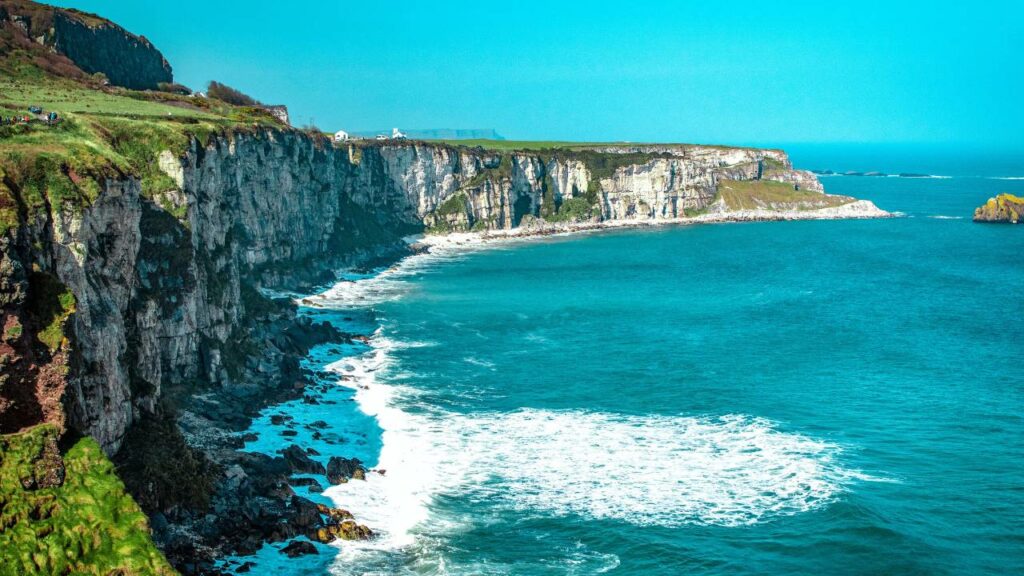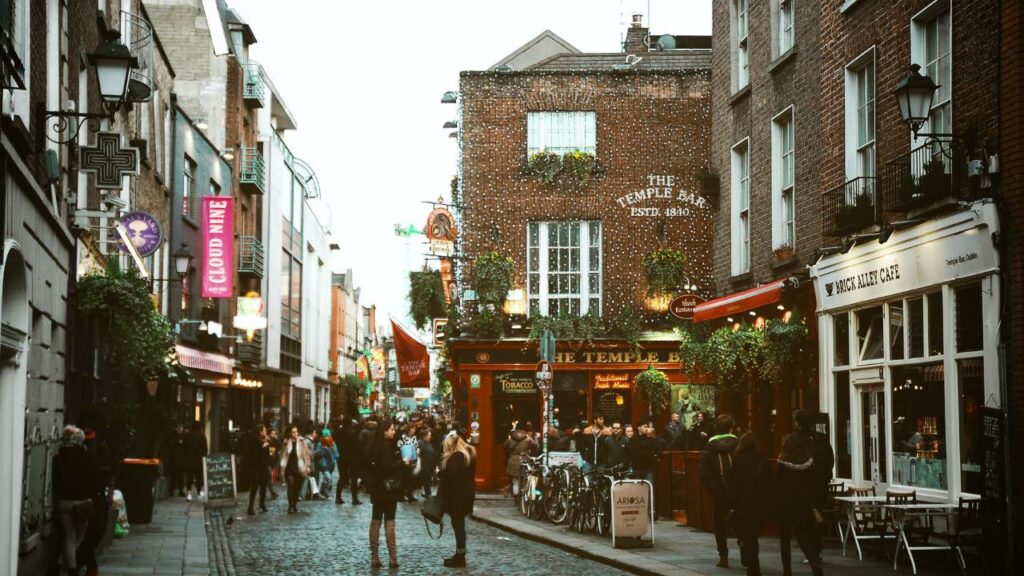Business travel to Ireland offers a unique blend of opportunities and challenges for professionals heading to the Emerald Isle. A vibrant country with a strong economy, Ireland attracts many international companies and entrepreneurs. However, successful business interactions in Ireland require an understanding of local customs and specific travel essentials to ensure a smooth experience.
Ireland’s business culture is rooted in strong relationships and trust, making it crucial for visiting professionals to connect with their Irish counterparts on a personal level. Being aware of cultural nuances and etiquettes can go a long way in establishing a positive professional rapport. Moreover, staying up-to-date with visa information and the latest travel guidelines is essential for a smooth travel experience without unforeseen issues.
Packing for Ireland can be challenging due to its unpredictable weather. Whether travelling for a conference or a business meeting, it’s important to include some essential items in your luggage. Considering aspects such as attire, adaptors, and any required documentation will help create a seamless experience, allowing visitors to focus on nurturing relationships and achieving their business objectives.
Understanding Ireland

Ireland, a beautiful island country, is situated in the North Atlantic Ocean and is bordered by Northern Ireland, which is part of the United Kingdom. It is a member of the European Union (EU) and boasts a rich history, captivating culture, and breathtaking landscapes.
Irish culture is diverse and has deep roots in literature, music, and folklore. It is renowned for its friendly locals, strong sense of community, and vibrant arts scene. Traditional Irish music is enjoyed by many, and the country’s literary legacy includes famous writers such as W.B. Yeats, Samuel Beckett, and James Joyce.
Ireland’s population primarily speaks English, but the Irish language remains an important aspect of the culture. Though, in recent years, an increasing presence of other cultures has contributed to the country’s multicultural fabric.
The country’s geography is marked by a stunning coastline, picturesque rivers, and vast peat bogs. The stunning Cliffs of Moher in County Clare are a must-visit landmark, with their dramatic 702-feet drop into the Atlantic Ocean. Killarney National Park in County Kerry offers a beautiful backdrop of mountains, lakes, and woodlands, perfect for outdoor enthusiasts, wildlife watchers, and those in love with photography.
Dublin, the capital city, is a bustling and lively destination steeped in history. Phoenix Park, one of the largest urban parks in Europe, can be found in Dublin and offers a welcome retreat from the city’s busy streets.
Ireland is a rich and diverse country that effortlessly combines a respect for tradition with a forward-thinking approach. From its hospitable population and unique culture to its stunning landscapes, Ireland is the perfect destination for business travellers seeking an authentic and unforgettable experience
Travel Preparations
When designing the perfect holiday experience – whether it’s business-related or not – it is essential to make proper travel preparations to ensure a smooth and successful experience. The timing of the trip can have an impact on the overall experience. Spring and autumn are ideal seasons to visit, as the weather is mild and pleasant, and there are fewer tourists compared to the summer months.
One important aspect to consider before travelling to Ireland is understanding the entry requirements. Although Ireland is part of the European Union, it is not part of the Schengen Area, and thus, travellers may need to fulfil specific passport and visa requirements. It is recommended to check with the Foreign and Commonwealth Office for the most up-to-date information on entry requirements for your country of origin.
Health considerations are equally important for a stress-free business trip. Make sure to be up to date with any vaccinations that could be required or advised for visiting Ireland. It is also beneficial to consult a travel clinic that provides vaccination advice and other useful travel services like well-regarded travel insurance.
When making travel arrangements in Ireland, considering the destination and local transportation options can be crucial. Planning ahead and organising airport transfers, accommodation, and transportation to meeting venues can save time and effort during the trip. In line with promoting sustainable travel, many Irish employers are engaging in Smarter Travel, a programme that focuses on using more environmentally friendly modes of transport.
Proper travel preparations can greatly enhance the Ireland business travel experience. Taking care of timing, entry requirements, health precautions, and transportation planning can help ensure a rewarding and enjoyable trip.
Getting Around in Ireland

Ireland offers various modes of transportation for business travellers, making it convenient to navigate the country efficiently. In Dublin, the capital city, you can find car, bus, train, tram, and taxi options for getting around.
Hiring a car is a popular choice for visitors who prefer flexibility and independence. Many major car rental companies have offices at airports and city centres. For those seeking a more personalised touch, especially when attending business meetings or events, opting for a service such as Irish Chauffeurs can elevate the experience. With professional drivers who know the intricacies of Dublin’s roads and the luxury of a comfortable vehicle, it becomes more than just travel – it’s an experience in itself. However, if you prefer public transportation, the Irish rail network, Iarnród Éireann, connects Dublin to other major cities and towns. Train journeys are generally comfortable and punctual, while offering a chance to enjoy Ireland’s scenic landscapes.
If you’d rather cut the costs of your business trip in Ireland, consider using buses – they’re a cost-effective and widespread option for travelling within and between towns and cities. Dublin’s extensive bus network, operated by Dublin Bus, serves both the city centre and suburbs. For intercity travel, Bus Éireann connects Dublin with other regions in the country. Private coach services such as Citylink and GoBus also provide reliable connections and are ideal for business travellers who want comfortable and punctual transport.
When in Dublin, the Luas tram system is another alternative for convenient travel within the city. The trams operate on two lines – the Green Line, connecting the south side of the city to the north side, and the Red Line, running from the west to the city centre. The trams are frequent and efficient, allowing travellers to navigate through the bustling city easily.
Lastly, taxis are a readily available mode of transportation in Ireland, particularly in Dublin. Irish taxis are metered, and you can find them at designated rank stands or hail them on the street. Additionally, smartphone apps like Free Now and Lynk facilitate taxi booking and save time, ensuring you reach your business appointments on schedule.
Business Practice in Ireland
Ireland is known for its friendly and welcoming atmosphere, making it an ideal place for business travel. When engaging in business activities in the country, it is essential to familiarise yourself with local customs, etiquette, and regulations to ensure a smooth experience.
Punctuality is an essential aspect of conducting business in Ireland, as arriving late can be considered impolite and inconsiderate. When travelling to Ireland for business purposes, it is crucial to plan your appointments carefully and to ensure you allocate enough time for transport arrangements.
There is no strict dress code in Ireland, but dressing professionally is generally expected during business meetings. A smart-casual style is usually adequate, with more formal attire reserved for high-level meetings or special occasions.
Understanding the local etiquette is vital for successful business interactions. The Irish appreciate a friendly, open, and diplomatic approach, with a balance between professionalism and personal warmth. Small talk, especially about the weather or sports, is common before delving into the main topic of a meeting. Building trust and developing solid relationships are key aspects of the Irish business culture.
Tipping in Ireland is not obligatory in most situations, but it is appreciated when receiving good service. In restaurants, a tip of 10-15% is customary. However, tipping is less common in other sectors such as taxis or hotels.
Public holidays in Ireland can affect business dealings, as many offices and businesses close during these times. Some of the most crucial public holidays to be aware of include St. Patrick’s Day, Easter, and Christmas.
Business regulations in Ireland are generally pro-business and transparent, making it a favourable environment for international business travellers. However, it is essential to familiarise oneself with any specific regulations related to your industry or area of expertise to ensure compliance.
While business travel often focuses on meetings and networking, it’s also important to keep a close eye on personal finances during your trip. Many professionals choose to utilise financial management apps or local banking services to monitor expenses and ensure they’re adhering to their budget. Being prudent with your financial management not only provides peace of mind but can also prevent any unexpected monetary challenges during your stay.
Money and Communications
When travelling to Ireland for business, it’s essential to be aware of the local currency and communication options to ensure seamless transactions and communication with colleagues, clients, and other professionals.
The official currency in Ireland is the Euro (€). Business travellers should make sure they have access to local currency, as many establishments may not accept credit or debit cards. It’s advisable to exchange currency before departure or use ATMs upon arrival, since airport and hotel currency exchange services can charge higher fees. To avoid potential fines, travellers should also be mindful of any restrictions related to the import and export of currency.
For communications, it’s crucial to note that the international dialling code for Ireland is +353. Business travellers should save important contact details, including the local office, client, or hotel phone numbers, in their devices using the appropriate dialling format. In-person meetings and calls should follow Irish business customs such as starting with informal greetings, exchanging pleasantries, and addressing colleagues by their first names.
In this digital age, having access to the internet is essential for business travellers. Reliable internet connections are widely available through Wi-Fi hotspots in hotels, cafes, and restaurants across Ireland. Moreover, acquiring a local SIM card for mobile phones can help minimise roaming charges and provide travellers with reliable access to mobile data for browsing and email access.
To stay connected during your trip without incurring additional costs, consider investing in an international roaming plan or purchasing a prepaid local SIM card. When using an Irish mobile network, be cautious of any additional fees for calls, texting, and data usage. Utilise messaging services and VoIP applications on Wi-Fi, where possible, to reduce expenses.
Being prepared with knowledge of local currency and communication options will help the business traveller navigate their trip to Ireland smoothly, ensuring they can focus on their work objectives and forming valuable professional relationships.
Stay Safe and Secure

In order to ensure a smooth and worry-free business trip in Ireland, it is vital to prioritise both safety and security. As a responsible traveller, be mindful of your surroundings and take necessary precautions to safeguard both your personal safety and that of your belongings1.
Before embarking on your journey, acquaint yourself with local laws and customs to avoid inadvertent offences. When travelling, it is advisable to carry a photocopy of your passport and other essential documents in case the originals are lost or stolen.
When in Ireland, follow these simple guidelines for enhanced security:
- Always remain vigilant, especially in crowded or tourist-heavy areas.
- Avoid displaying large sums of money or expensive belongings.
- Use a secure bag or pouch to store important items, such as passports, tickets, and cash.
In terms of accommodation, choose reputable establishments with comprehensive security measures in place. It is advisable to make use of in-room safes and lockboxes provided by your hotel to keep valuables secure.
During your business trip, stay informed about potential risks and emergency situations. Sign up for travel alerts from your country’s embassy or consulate, and keep abreast of local news and developments.
Regarding health, stay up to date with any vaccines or medical advice pertinent to Ireland and ensure you have adequate travel insurance to cover medical emergencies2. The Irish Health Service Executive (HSE) provides helpful information and guidelines for travellers.
Finally, establish reciprocal support systems by keeping in regular contact with both colleagues in Ireland and friends or family back home. In case of emergency, they can provide assistance and valuable information to help you navigate unexpected situations.
By following these guidelines and conducting thorough research before your trip, you can confidently embark on your Irish executive odyssey with both safety and security.
Conclusion
Ireland, with its rich history, cultural tapestry, and vibrant business environment, offers unparalleled opportunities for global professionals. To make the most of a business trip to the Emerald Isle, understanding local customs, preparing meticulously for travel, and prioritising personal safety are paramount.
By being well-informed and proactive, business travellers can ensure a seamless, productive, and memorable experience, fully embracing the warmth and dynamism of Ireland while also achieving their professional objectives. Whether you’re sealing a deal, networking, or exploring future collaborations, Ireland promises both business growth and a taste of its enchanting charm.


